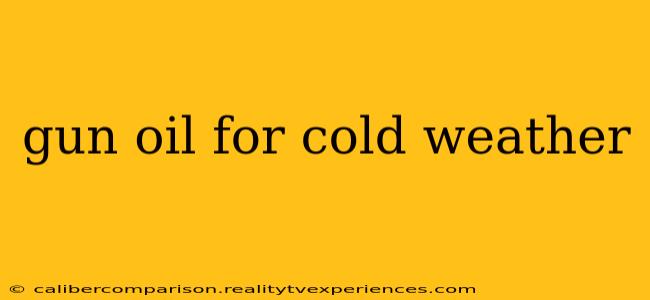Winter's harsh conditions can wreak havoc on your firearms, and choosing the right gun oil is crucial for reliable performance in freezing temperatures. Standard gun oils can thicken significantly in cold weather, hindering smooth operation and potentially causing malfunctions. This comprehensive guide explores the critical aspects of selecting and using gun oil specifically designed for cold weather conditions, ensuring your firearms remain dependable even in sub-zero temperatures.
Understanding the Challenges of Cold Weather on Firearms
Cold temperatures affect gun oil in several key ways:
- Increased Viscosity: As temperatures drop, gun oil thickens, becoming less fluid and less effective at lubricating moving parts. This increased viscosity can lead to sluggish operation, stiff actions, and increased wear and tear.
- Reduced Lubrication: Thickened oil doesn't penetrate as effectively, leaving metal surfaces dry and vulnerable to friction, potentially leading to jams or malfunctions.
- Corrosion Concerns: Moisture becomes a greater threat in cold, damp conditions. Insufficient lubrication increases the risk of corrosion, damaging the internal mechanisms of your firearm.
Choosing the Right Gun Oil for Cold Weather: Key Considerations
Selecting the right gun oil for cold weather requires understanding specific characteristics:
1. Low-Temperature Viscosity:
This is the most critical factor. Look for oils explicitly marketed for cold weather use, highlighting their low-temperature performance. The oil's viscosity rating (e.g., weight) should be specified, ensuring it remains fluid even in freezing conditions.
2. Water Displacement Properties:
Moisture is a significant enemy of firearms. Choose an oil with strong water displacement properties to prevent rust and corrosion in damp or snowy environments.
3. Chemical Stability:
The oil should remain chemically stable at low temperatures, avoiding separation or degradation that could hinder its lubricating properties.
4. Compatibility with Materials:
Ensure the oil is compatible with the materials used in your firearms (e.g., steel, aluminum, polymers). Some oils may react negatively with certain materials in extreme cold.
Recommended Types of Gun Oil for Cold Weather
While specific brand recommendations are beyond the scope of this article to maintain neutrality, several types of gun oil are well-suited for cold weather:
- Synthetic Gun Oils: Generally offer superior low-temperature performance compared to petroleum-based oils. They remain fluid in colder temperatures and provide better lubrication.
- Specialty Cold Weather Formulas: Many manufacturers produce specific oils designed for extreme cold conditions. These are formulated to maintain fluidity and lubricity even in sub-zero temperatures.
Applying Gun Oil in Cold Weather: Best Practices
Proper application is crucial for effectiveness:
- Warm the Oil (Slightly): If the oil is extremely thick, gently warming the bottle in your hands can improve its fluidity for easier application. Avoid excessive heat.
- Targeted Application: Apply oil sparingly to critical friction points, such as the slide rails, bolt lugs, and trigger mechanism. Avoid excessive oil, which can attract dirt and grime.
- Wipe Off Excess: After application, carefully wipe away any excess oil to prevent the build-up of dirt and debris.
- Regular Cleaning and Maintenance: Even with specialized cold-weather oil, regular cleaning and maintenance are essential to ensure optimal performance and prevent corrosion.
Maintaining Your Firearms in Extreme Cold: Additional Tips
Beyond choosing the right oil, consider these supplementary practices:
- Store Firearms Properly: Store your firearms in a cool, dry place to prevent moisture damage and minimize temperature fluctuations.
- Use Appropriate Storage Cases: Hard cases offer better protection against the elements compared to soft cases.
- Protect from Moisture: Avoid exposing your firearms to excessive moisture or snow.
By understanding the challenges of cold weather on firearms and selecting the appropriate oil and maintenance practices, you can ensure your firearms remain reliable and dependable throughout the winter months. Remember that consulting with experienced firearm owners or professionals can provide additional valuable insights tailored to your specific firearm and environmental conditions.

